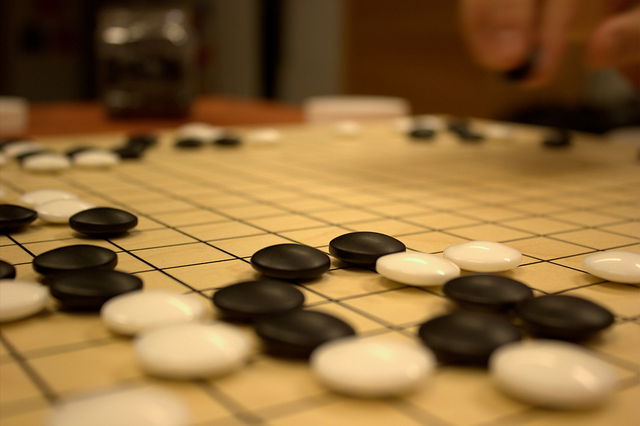This week we’ve got stories about the next-generation of DeepMind’s Go-playing AI, a new (and potentially dangerous) attack on WiFi security, and a scandal that’s going to affect the manufacturing of a lot of the things you like to use. It’s the science and technology roundup for Sunday, October 22, 2017!
AlphaGo Zero
This week saw the announcement of a new version of the DeepMind-based Go playing software AlphaGo, which beat champion human player Lee Seedol four games to one in March 2016. That version was “trained up” by feeding it thousands of games played by some of the best human players; the new version, AlphaGo Zero, trained itself from scratch. Essentially, what it did was to start with random placements, trying to gauge over time what it thought would be the move most likely to help it win. And then it played itself, over and over and over again, learning every time. By the time it was done training itself, about three days later (though that was 4.9 million games), it was able to beat the old AlphaGo—the one that beat one of the best human players on Earth—a hundred games to zero. What’s more, the new version uses substantially less in the way of resources: while the old AlphaGo needed forty-eight Tensor Processing Units (TPUs), AlphaGo Zero cuts that to just four. The results of the work are found in the journal Nature, under the title “Mastering the game of Go without human knowledge.” I’ll say.

KRACK
One of the most widely-used means of securing WiFi connections, WPA2, has been proven insecure this week with the announcement of a new attack called KRACK, or Key Reinstallation Attack. Basically, when you sign into a WiFi network, there’s something called a 4-way handshake between your device and the router. Simply put, this “getting connected” phase is what the hack exploits, allowing devices not on the WiFi network to intercept and modify data going between your device and the router. This could mean that if you’re at a trusted site, you’ll get a little something untrustworthy subbed in there by someone else in WiFi range. Now, patches are rolling out over the coming weeks, and using https religiously (and VPNs, if you can) will help, because if they can see all your data but it’s still encrypted they’ll have a significantly harder time messing with you. You can read a great explainer here, and keep up with the patch progress here. In the meantime, maybe don’t connect to that sketchy public WiFi at your local coffee shop for now. And keep your software up to date.

Kobe Steel, Aluminum, and Copper
A massive Japanese metals company’s wrongdoing may significantly affect as many as 500 other major companies that use their products, after it came to light this week that many of their reports on strength and durability were, for lack of a better word, “fudged.” The practice, it turns out, goes as far back as ten years, and the full fallout is still being calculated. Kobe provides steel, aluminum, and copper for everything from cars to bullet trains to rockets to airplanes, and if the materials aren’t actually as strong or tough as they’re supposed to be, well, that could be a serious problem. This is just another example of manufacturing companies putting their ever-shrinking bottom lines above the welfare of the consumers, whether it’s faking emissions reports, falsifying airbag safety data, or lying (as here) on product quality reports, many companies have gone in the direction of lying to preserve their shareholder value. I’ll be keeping an eye out for how this progresses, but it’s not going to be painless for anyone. You can read more at Jalopnik.
Best of the Rest
As always, there’s more than I can explain to you myself each week, so here it is: your weekly linkspam!
- Didn’t get a Super Nintendo Classic? Consider this instead (if you’ve got the cash)
- Those new border wall prototypes aren’t going to stop drugs, because drones
- The US EPA is scrubbing climate change stuff from its website, because the US is run by science deniers
- There’s a neat online tool for learning (and preserving) Mi’kmaq
- Phil Plait has a new post explaining that the world isn’t under any obligation to help us live on it, and
- If you haven’t seen it yet, Elle’s annual “sexy” Halloween costume roundup is up, and it’s worth a look.
That’s all for today. Have a great week.
***
Thanks again for reading. Except for the very *very* occasional tip, we only get paid in my own (and your) enthusiasm, so please like This Week In Tomorrow on Facebook, follow us on Twitter @TWITomorrow, and tell your friends about the site!
If you like our posts and want to support our site, please share it with others, on Facebook, Twitter, Reddit — anywhere you think people might want to read what we’ve written. If there’s something you think we’ve missed or a story you’d like to see covered, drop us a line! Thanks so much for reading, and have a great week.
***
Richard Ford Burley is a human, YA author, and doctoral candidate at Boston College, as well as Deputy Managing Editor at Ledger, the first academic journal devoted to Bitcoin and other cryptocurrencies. In his spare time he writes about science, skepticism, feminism, and futurism here at This Week In Tomorrow.

